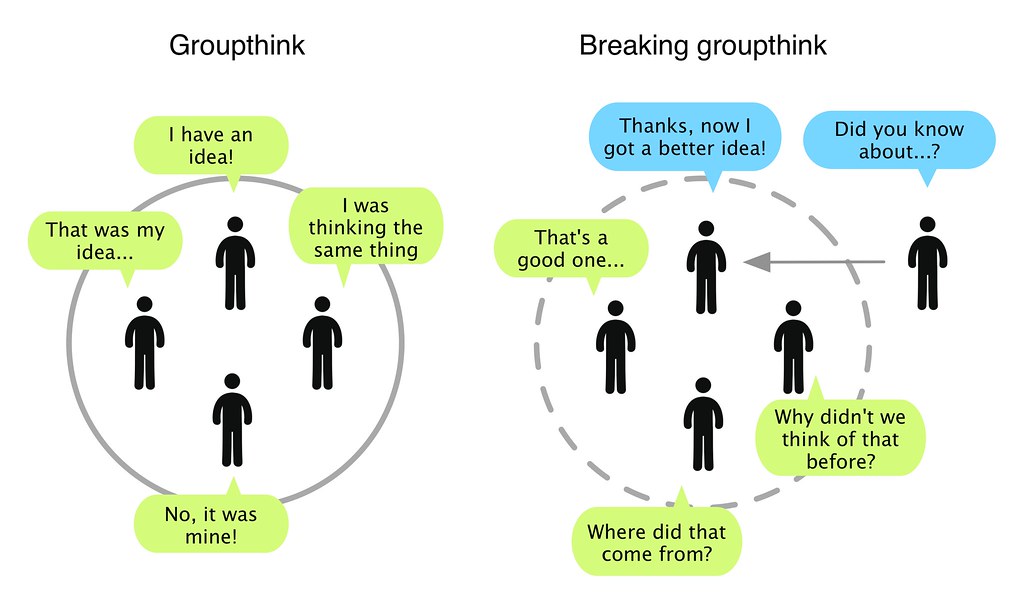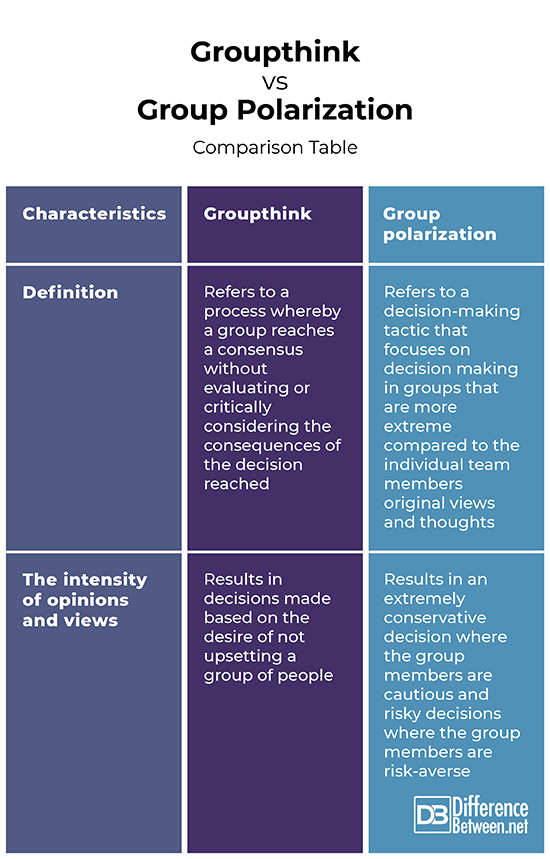Difference Between Groupthink and Group Polarization
People have different personalities. When brought together, ideologies and habits often differ. When in work or school discussions, meetings and even friendly meet-ups, you probably note of the different personalities around. These groups or meetings often lead to groupthink and group polarization, mostly noticeable at the end of a meeting whereby people may discard their opinions and run along with those of others or stick to their opinions. This can be explained by differentiating groupthink and group polarization as outlined in this article.

What is Groupthink?
Based on the desire of not upsetting a group of people, this is a process whereby a group reaches a consensus without evaluating or critically considering the consequences of the decision reached. To avoid conflict, individuality and creativity are diminished.
This trend is not only diminishing to individuals but also to employees whereby employees may fail to suggest ideas in the fear of upsetting others, especially the management. Groupthink can be avoided by allowing members to debate issues independently. It also helps if enough time is given for issues to be discussed which reduces rush decisions.

What is Group Polarization?
Group polarization has become a common phenomenon.
This is a decision-making tactic that focuses on decision making in groups that are more extreme compared to the individual team members’ original views and thoughts. It occurs as a result of social comparison. This happens when individuals approach a group decision-making process feeling that their opinions are superior compared to those of other members. Once the discussion commences, the individuals then learn that their views are much basic whereby they either their narrative to either extremely risky or extremely conservative, where they enjoy the extreme position. This influences decision making in the group.
Group polarization results in an extremely conservative decisions where the group members are cautious. On the other hand, if the group members are risk-averse, the decision made tend to be risky.
Similarities between Groupthink and Group polarization
- Both refer to collective group traits
Differences between Groupthink and Group polarization
Definition
Groupthink refers to a process whereby a group reaches a consensus without evaluating or critically considering the consequences of the decision reached. On the other hand, group polarization refers to a decision-making tactic that focuses on decision making in groups that are more extreme compared to the individual team members’ original views and thoughts.
The intensity of opinions and views
While groupthink results in decisions made based on the desire of not upsetting a group of people, group polarization results in an extremely conservative decisions where the group members are cautious and risky decisions where the group members are risk-averse.
Groupthink vs. Group polarization: Comparison Table

Summary of Groupthink vs. Group polarization
Groupthink refers to a process whereby a group reaches a consensus without evaluating or critically considering the consequences of the decision reached. It results in decisions made based on the desire of not upsetting a group of people. On the other hand, group polarization refers to a decision-making tactic that focuses on decision making in groups that are more extreme compared to the individual team members’ original views and thoughts. It results in an extremely conservative decisions where the group members are cautious and risky decisions where the group members are risk-averse.
- Difference Between Profit Center and Investment Center - July 2, 2022
- Difference Between Anti-Trust and Anti-Competition - June 6, 2022
- Difference Between Stocktaking and Stock Control - June 6, 2022
Search DifferenceBetween.net :
Leave a Response
References :
[0]Coutts L & Schneider F. Applied Social Psychology: Understanding and Addressing Social and Practical Problems. SAGE Publishers, 2011. https://books.google.co.ke/books?id=BPG_JE052sIC&pg=PA239&dq=Difference+between+Groupthink+and+Group+polarization&hl=en&sa=X&ved=2ahUKEwip7JC5y83qAhUOkhQKHYBWBawQ6AEwAHoECAAQAg#v=onepage&q=Difference%20between%20Groupthink%20and%20Group%20polarization&f=false
[1]Anthony R. Pratkanis. The Science of Social Influence: Advances and Future Progress. Psychology Press, 2011. https://books.google.co.ke/books?id=1pGkEmri1JEC&pg=PA223&dq=Difference+between+Groupthink+and+Group+polarization&hl=en&sa=X&ved=2ahUKEwip7JC5y83qAhUOkhQKHYBWBawQ6AEwBHoECAUQAg#v=onepage&q=Difference%20between%20Groupthink%20and%20Group%20polarization&f=false
[2]Austin J & Leong F. The Psychology Research Handbook: A Guide for Graduate Students and Research Assistants. SAGE Publishers, 2006. https://books.google.co.ke/books?id=BDml4p6aw0oC&pg=PA228&dq=Difference+between+Groupthink+and+Group+polarization&hl=en&sa=X&ved=2ahUKEwip7JC5y83qAhUOkhQKHYBWBawQ6AEwA3oECAIQAg#v=onepage&q=Difference%20between%20Groupthink%20and%20Group%20polarization&f=false
[3]Image credit: https://live.staticflickr.com/461/20322082659_ac2b668986_b.jpg
[4]https://live.staticflickr.com/8362/8427264300_74020fb7c0_z.jpg
